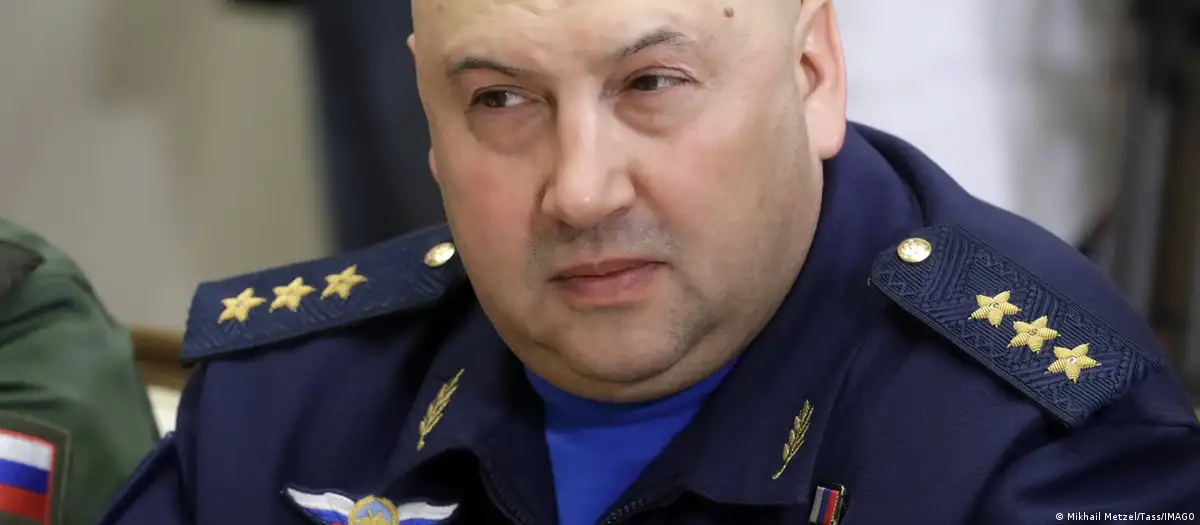US newspaper points out that a top Russian commander of the war in Ukraine was informed of the Wagner Group leader’s mutiny plans. Kremlin calls report speculation.
(DW) Russian General Sergei Surovikin, deputy commander of Russian military operations in Ukraine, knew about the mutiny plans of the leader of the Wagner paramilitary group, The New York Times reported on Wednesday (June 27), citing US government advisers who received intelligence information.
Hours later, the Kremlin called the news speculation. “Around these events there will be a lot of speculation and conjecture. I believe this is one example,” the Kremlin spokesman said.
American advisers added that there are signs that other Russian generals would have supported the attempt by mercenary leader Yevgueni Prigozhin to forcibly overthrow the leadership of Russia’s Defense Ministry.
According to these same sources, it is still unclear whether Surovikin, the previous commander of Russian troops in Ukraine, would have helped plan Prigozhin’s revolt late last week.
Respected Leader
Political analysts see Surovikin as a respected leader among the Russian military who helped strengthen Russian positions on the battlefronts after last year’s Ukrainian counteroffensive, the New York Times said.
He was appointed to command Russian forces in Ukraine in November and replaced as early as January, but, according to the newspaper, he has retained influence in the execution of war operations and is very popular among the soldiers.
Prigozhin worked with Surovikin during the Russian military intervention in Syria and has described the general as the most capable in the Russian Armed Forces.
U.S. government officials assess that Prigozhin would not have started his rebellion if he did not expect to have the support of others in positions of power, the New York Times wrote.
U.S. intelligence is still trying to determine what degree of support Prigozhin had within the Russian military leadership. Analysts note that the Wagner Group easily took over the military campaign HQ in Rostov.
Infighting
If Surovikin was indeed involved in the rebellion, this would be another sign of the infighting within the Russian military leadership since the start of the war in Ukraine and could indicate a deeper divide between Prigozhin’s supporters on the one hand and President Vladimir Putin’s top military advisers on the other: Defense Minister Sergei Shoigu and Chief of Staff Valery Gerasimov, the daily added.
The newspaper indicates, however, that American authorities are interested in spreading information that will damage the prestige of Surovikin, who is considered more competent and ruthless than the other members of the command, and whose removal would benefit Ukraine.
Last Friday, shortly after the uprising began, Surovikin had called on fighters in the Wagner group to stop and return to their barracks before it was too late. “It is necessary to obey the will and orders of the elected president of Russia,” he said in a video broadcast on Telegram by a Russian state television journalist.
Change in war command
In January, Shoigu appointed Gerasimov commander of Russian forces in Ukraine, replacing Surovikin, who had assumed the post just three months ago.
Surovikin’s conduct of the war was repeatedly praised by Prigozhin, who has referred to Shoigu in the worst possible terms and numerous times criticized Gerasimov.
In February, for example, Prigozhin said that when Surovikin was commanding Russian forces in Ukraine, the Wagner Group had no ammunition problems.
He then suggested that the problems began when the leadership of the campaign was taken over by Gerasimov. He spoke that while some eat with “silverware” and send their daughters and grandchildren on vacation to Dubai, “Russian soldiers are dying on the battle line.”
Rivalry with Shoigu and Gerasimov
The tension between Prigozhin on one side and Shoigu and Gerasimov on the other reached a high point on June 10, when Shoigu announced that mercenary groups, such as Wagner, would have to sign contracts with the Defense Ministry by July 1.
Putin supported Shoigu’s decision, but Prigozhin reaffirmed his refusal to sign any contracts. Already at that moment Western intelligence detected that the tension could result in a rebellion by the head of the Wagner Group.
On Monday, in justifying the end of his rebellion, Prigozhin said he needed to save the organization and rejected having attempted a coup. “The goal of the march was to prevent the destruction of the Wagner group,” Prigozhin said in an 11-minute audio message in which he broke the silence he had maintained since Saturday, when he backed out of the “march on Moscow.” According to him, the Wagner group “was threatened with dismantling by the Russian authorities.”
The mercenary leader insisted that the goal was not to overthrow power in the country.
According to Belarus dictator Aleksandr Lukashenko, who brokered the deal to end the uprising, the head of the Wagner Group demanded that Putin oust Shoigu and Gerasimov.
Armed rebellion
Prigozhin, a longtime Putin ally, launched an armed rebellion with his mercenaries on the night of June 23, claiming that the Russian military killed several of his fighters in an air strike, which Russian authorities denied.
A day later, when the march he led reached about 200 kilometers from Moscow, Prigozhin announced that he was ending the rebellion. Shortly thereafter, the Kremlin announced that the mercenary leader would go to Belarus, based on a deal brokered by Lukashenko, and that criminal charges against the rebels would be dropped.
Prigozhin, who said he had no intention of overthrowing Putin, arrived in Belarus on Tuesday, and Russian authorities said they had closed a criminal investigation into the armed rebellion.
as (Efe, Lusa, Reuters, OTS)
